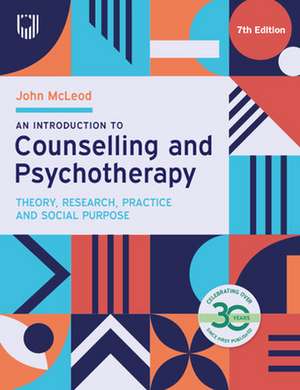An Introduction to Counselling and Psychotherapy: Theory, Research, Practice and Social Purpose, 7th Edition
Autor John McLeoden Limba Engleză Paperback – 25 mar 2025
The book retains its comprehensive coverage of both mainstream and emerging approaches to therapy, and professional issues such as supervision, training, therapist development, ethical standards and research-informed practice. New to this edition is wider coverage of issues such as racism, the climate crisis, gender and sexuality; debates around neuroscience, spirituality and integrative approaches to therapy; and third-wave transdiagnostic cognitive-behavioural therapies such as ACT, mindfulness and FAP.
Fully revised and updated throughout, the seventh edition also contains:
•Access to complementary online resources
•Case studies
•Landmark and contemporary research studies
•Critical analysis of the cultural, historical and social context of therapeutic approaches
•Reflection and discussion topics
•Suggestions for further reading
This book equips readers with the confidence to navigate and apply a range of therapeutic models. Building on the author’s extensive research and professional experience, the 7th edition of An Introduction to Counselling and Psychotherapy remains the definitive guide for students and practitioners.
John McLeod is a household name in the world of C&P education. John has held Professorial position at the Universities of Keele, Abertay, Oslo, Padua, and Massey and at the Institute for Integrative Counselling and Psychotherapy, Dublin. He has published 14 books and more than 100 articles and chapters, and has an international reputation as a leading figure in counselling and psychotherapy practice and research.
Preț: 248.73 lei
Preț vechi: 320.15 lei
-22% Nou
Puncte Express: 373
Preț estimativ în valută:
47.60€ • 51.69$ • 39.98£
47.60€ • 51.69$ • 39.98£
Carte nepublicată încă
Doresc să fiu notificat când acest titlu va fi disponibil:
Se trimite...
Preluare comenzi: 021 569.72.76
Specificații
ISBN-13: 9780335252312
ISBN-10: 0335252311
Pagini: 740
Dimensiuni: 185 x 245 mm
Ediția:7
Editura: McGraw Hill Education
Colecția Open University Press
Locul publicării:United Kingdom
ISBN-10: 0335252311
Pagini: 740
Dimensiuni: 185 x 245 mm
Ediția:7
Editura: McGraw Hill Education
Colecția Open University Press
Locul publicării:United Kingdom
Cuprins
Part 1 Counselling and psychotherapy in a changing world
1 The historical and socio-political context of contemporary practice
Part 2 What happens in therapy: the common ground
2 What it’s like to be a client
3 What it’s like to be a therapist
4 Building a therapeutic relationship: working together
5 The process of therapy: the beginning
6 The hard work: choices, learning, and change
7 Leaving therapy
Part 3 Conceptualising the practice of therapy
8 The psychodynamic tradition
9 The cognitive–behavioural perspective
10 Interpersonal therapies
11 Person-centred, humanistic, and experiential approaches
12 Transactional analysis: a comprehensive theoretical system
13 Gestalt therapy
14 Existential therapy
15 Narrative therapy
16 Working with families
17 The use of art in therapy
18 Therapy in nature: using the outdoor environment
19 Religion and spirituality
20 Embodied conversations: implications of developmental neuroscience
21 Integrative therapies
22 Pluralistic therapy
Part 4 How therapy can contribute to building a better world
23 Making sense of the historical context of contemporary practice
24 Principles of culturally-sensitive therapy
25 Using therapy to overcome social injustice
26 Facing up to colonialism, racism and white privilege
27 Supporting clients to deal with gender-based violence and oppression
28 Working with individuals, families and communities to come to terms with climate anxiety, grief and trauma
Part 5 Being a therapist
29 The qualities of effective therapists
30 Professional structures for supporting therapist competence
31 An ethical and moral framework for therapy
32 Using research to inform practice
33 Delivery formats to enhance access and effectiveness: on-line therapy and beyond
34. Looking ahead: Future challenges for the psychotherapeutic professions
1 The historical and socio-political context of contemporary practice
Part 2 What happens in therapy: the common ground
2 What it’s like to be a client
3 What it’s like to be a therapist
4 Building a therapeutic relationship: working together
5 The process of therapy: the beginning
6 The hard work: choices, learning, and change
7 Leaving therapy
Part 3 Conceptualising the practice of therapy
8 The psychodynamic tradition
9 The cognitive–behavioural perspective
10 Interpersonal therapies
11 Person-centred, humanistic, and experiential approaches
12 Transactional analysis: a comprehensive theoretical system
13 Gestalt therapy
14 Existential therapy
15 Narrative therapy
16 Working with families
17 The use of art in therapy
18 Therapy in nature: using the outdoor environment
19 Religion and spirituality
20 Embodied conversations: implications of developmental neuroscience
21 Integrative therapies
22 Pluralistic therapy
Part 4 How therapy can contribute to building a better world
23 Making sense of the historical context of contemporary practice
24 Principles of culturally-sensitive therapy
25 Using therapy to overcome social injustice
26 Facing up to colonialism, racism and white privilege
27 Supporting clients to deal with gender-based violence and oppression
28 Working with individuals, families and communities to come to terms with climate anxiety, grief and trauma
Part 5 Being a therapist
29 The qualities of effective therapists
30 Professional structures for supporting therapist competence
31 An ethical and moral framework for therapy
32 Using research to inform practice
33 Delivery formats to enhance access and effectiveness: on-line therapy and beyond
34. Looking ahead: Future challenges for the psychotherapeutic professions
